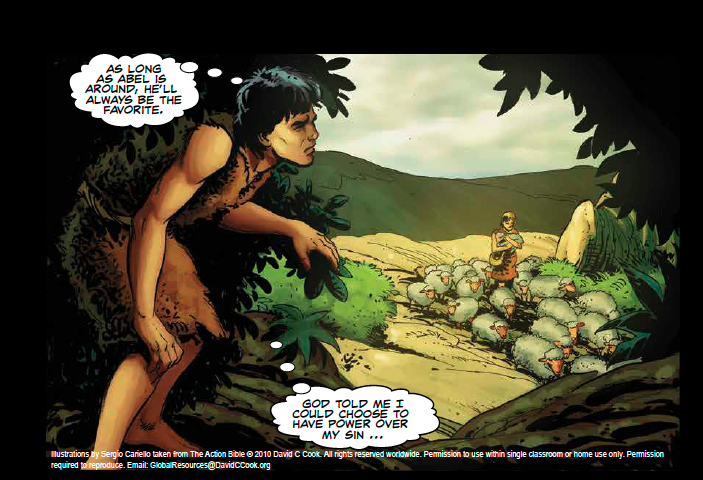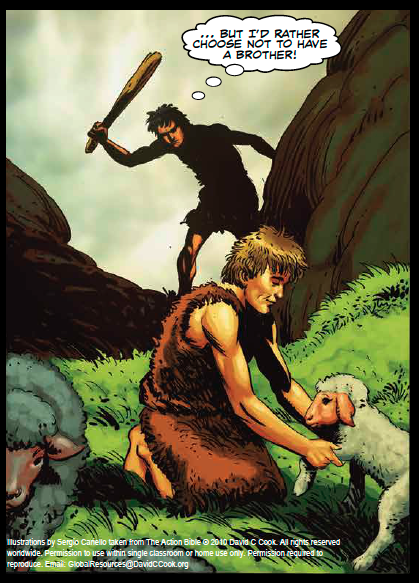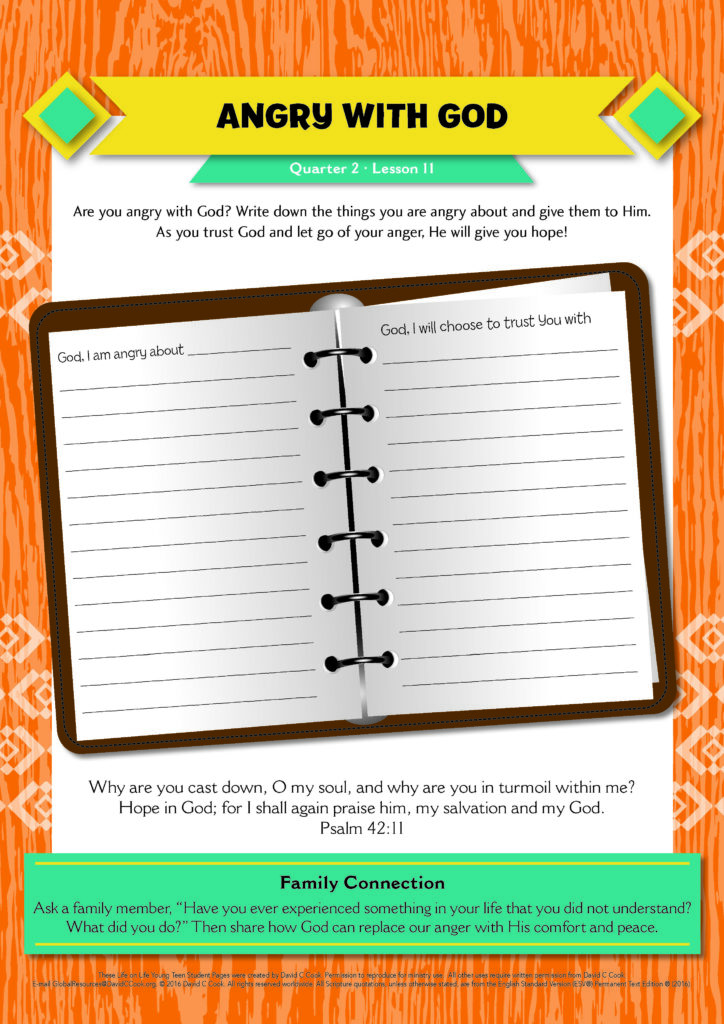During the lesson, the information for you to know is written in regular type, and what we suggest speaking or reading aloud to children is in bold. All resources for this lesson, including the Teacher Guide and Student Page, can be downloaded in a ZIP file by clicking on the following link:
In some lessons you will find "resource articles." These are articles written by experts from around the world to help equip you for your work with children and adolescents. Share them with parents or guardians if you consider it appropriate.
I say to God my Rock, “Why have you forgotten me? Why must I go about mourning, oppressed by the enemy?” My bones suffer mortal agony as my foes taunt me, saying to me all day long, “Where is your God?” Why, my soul, are you downcast? Why so disturbed within me? Put your hope in God, for I will yet praise him, my Savior and my God.
Psalm 42:9–11
If you could ask God anything, what would it be? Would you ask Him how frogs can breathe through their skin? Or why the clouds always move? Or why He created ants? Would you ask how He placed the planets and stars in the sky? Or would you ask Him why He loves you so much that He gave His only Son for you? From our human perspective, God is filled with mystery. His ways are awe-inspiring and completely beyond our comprehension.
But sometimes our questions about God lead us to anger instead of awe. Why does He allow babies to die? Why doesn’t He stop genocide? Why does He give health to some and illness to others? Why has He allowed pain, disappointment, and struggles to cause chaos in your life? Why has He not answered your prayers?
When you feel your wonder giving way to anger, remember, as the psalmist did, that God is always faithful, always good, and always worthy of our praise. When you are downcast and in turmoil, remember that your hope is in the Lord, your rock and your salvation. He has not forgotten you. And He will always love you. Let go of your anger and praise Him for His mysterious ways—ways that are always for your good and His glory.
Encourage the teens to ask their family members, “Have you ever experienced something in your life that you did not understand? What did you do?” They can then share how God can replace our anger with His comfort and His peace.
Teacher Tip: If possible, email or text the Family Connection Card to the families of your students.
Welcome your teens. Let them know that today they will continue to learn about how to handle anger.
Have the students pair up—boys with boys and girls with girls. Explain that 1 partner will draw a picture on his partner’s back with his finger. He can choose any picture he wants, but simple shapes or pictures work best. When the teen is done drawing on his partner’s back, the partner will guess what was drawn on his back. The partners will switch roles and do the activity again. Allow 3–4 minutes for this activity.
We could not see what the other person was drawing. We could only guess at what the person was drawing. We did not have the whole picture.
Sometimes you experience bad things in your life. You may not understand what is happening, but you know that something is wrong. The situation may be painful or frightening. You may feel abandoned, rejected, or betrayed. It may be like when your partner was drawing on your back—you do not have enough information to understand the situation. Even though you may want to see the whole picture, you can only guess at part of it.
In situations like these, many times our reaction is to become angry with others—and especially with God. You may feel He is the one who has abandoned, rejected, or betrayed you. Anger toward God can be very confusing! It feels like an extra conflict inside of our hearts when we are already struggling. Today we will learn about how we can handle this particular anger.
Teacher Tip: Your students may have experienced injustice. People may have done bad things to them, neglected them, and abused them. They might be wondering why God did not do something to keep them from being hurt. As teens ask these questions, point them toward God’s goodness. We live in a broken world with broken people who do terrible things. Yet God’s love can create something beautiful, even from the brokenness we experience in life.
Divide teens into groups of 4–5. Have your students read the story of Cain and Abel aloud from the Bible in sections, as listed here. After each section, the groups will discuss the questions. Show the Action Bible image if possible.
Now Abel kept flocks, and Cain worked the soil. In the course of time Cain brought some of the fruits of the soil as an offering to the Lord. And Abel also brought an offering—fat portions from some of the firstborn of his flock. The Lord looked with favor on Abel and his offering, but on Cain and his offering he did not look with favor. So Cain was very angry, and his face was downcast.
Genesis 4:2b–5
In Old Testament times, God’s people brought offerings to Him as a sign of worship. Bringing a gift to God was a way to show that a person loved God and put Him before all else.
The Bible does not say why God accepted Abel’s sacrifice and did not accept Cain’s offering. But the book of Hebrews in the New Testament tells us that “by faith Abel offered to God a more acceptable sacrifice than Cain,” indicating that Cain brought his offering as a responsibility rather than a loving gift for God.
The rejection of his offering made Cain angry. He may not have understood why God had rejected his gift. Who do you think Cain was angry with?
This lack of understanding may have made him angry with God. He also may have been angry with his brother, since his brother’s gift was accepted and his was not.
Continue reading from the Bible. Show the Action Bible image if possible.

Then the Lord said to Cain, “Why are you angry? Why is your face downcast? If you do what is right, will you not be accepted? But if you do not do what is right, sin is crouching at your door; it desires to have you, but you must rule over it.”
Genesis 4:6–7
When the Lord asked Cain why he was angry, He knew what was in Cain’s heart—and He knew that Cain’s anger was not healthy or reasonable. Because unhealthy, prideful anger often leads to sin, God warned Cain not to let his anger cause him to sin.
Continue reading aloud from the Bible. Show the image from The Action Bible if possible.

Now Cain said to his brother Abel, “Let’s go out to the field.” While they were in the field, Cain attacked his brother Abel and killed him. Cain spoke to Abel his brother. And when they were in the field, Cain rose up against his brother Abel and killed him.
Genesis 4:8
The teens will discuss the following questions in their small groups. Pause after you ask each question to give groups time to discuss.
Because God loved Cain, He warned Cain not to let his anger cause him to sin. But Cain may have been too angry to listen—or maybe his heart was not open to what God wanted to tell him. Cain let his anger take control of his life.
God is perfect. He is always right—even when we cannot understand how what is happening can possibly be good. He is all-loving, all-wise, all-powerful, all-holy. God never deserves our anger. We can always trust that He loves us and wants the best for us. But He also knows that we are human—and that we sometimes let our human emotions take control of our behavior. He knows that sometimes we do not understand the fear and pain that make us angry. He knows we do not always express our emotions in healthy ways. But He will show us grace and mercy, and He will comfort us and give us peace.
Optional: If you are using the Student Pages, the teens can write their thoughts on the pages to prepare for the Responding activity.

When Cain was angry, he did not go to God for help. Instead, he became angry with God and let his anger cause him to sin. But there is another option. In Psalm 42:9–11, the psalmist was angry, but he approached God with his anger. He told God about his hurt and his feelings of abandonment. He asked God why he had to experience this pain. Then he put his trust in God and looked to Him for comfort and hope. Listen as I share these verses:
I say to God my Rock, “Why have you forgotten me? Why must I go about mourning, oppressed by the enemy?” My bones suffer mortal agony as my foes taunt me, saying to me all day long, “Where is your God?” Why, my soul, are you downcast? Why so disturbed within me? Put your hope in God, for I will yet praise him, my Savior and my God.
Psalm 42:9–11

Explain to the teens that they will do an action prayer that follows these verses. Everyone will sit on the floor. Each teen should have some space around her. Have the students close their eyes and listen to your instructions.
We are going to take our anger to God. If you are not ready or you do not yet trust that God will listen to you and heal your anger, you can still do this with us. Just think of pounding out your anger. But remember—if you decide you want to accept God’s gift of grace, He will help you to replace your anger with peace.
Now we will begin. Start by lightly patting the ground with your open hands.
Lead teens in patting the ground while you continue to speak.
You can take your anger to God. Imagine that you are walking respectfully toward His throne. He is waiting for you. He is ready to listen.
Lead teens in patting the ground for about 30 seconds as they imagine approaching the throne.
Begin patting the ground harder and faster. You can tell God what is making you angry. You can ask Him questions. You can share your strong and deep emotions with Him—even your anger.
Lead teens in patting the ground harder for about 30 seconds as they talk with God.
Now pat the ground very hard and fast. You can tell God all about your anger. Pound the floor! You can feel the power of your anger and then give it up to God! His power is greater!
Lead teens in patting the ground very hard for about 20 seconds.
You may feel tired. Your hands may begin to hurt a bit. Now begin to release your anger. Pat a little quieter.
Allow teens to begin to pat more quietly for a few moments.
Pat even more quietly and slowly. You can tell God that you want to trust Him—even if you have never trusted Him before. You can ask Him for the hope that only He can give. He will help you to heal and will replace your anger with His love.
Lead teens in patting softly for about 30 seconds. Then ask them to place their hands, palms up, on their knees to receive this blessing based on Psalm 22:24.
Blessing: God has not hidden His face from you. He hears your cries for help. May you feel His compassion for you. May you praise His name—even if you are feeling anger or pain. As you praise His name, He will replace your anger with His love and peace.
Lead your students in singing this quarter’s song if possible.
Life on Life ©2020 David C Cook. Reproducible for home or classroom use only. All other uses require written permission from David C Cook [email protected]. All rights reserved.